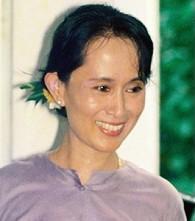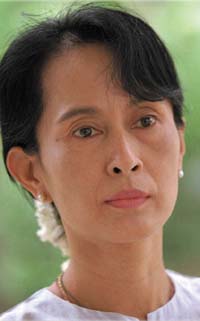Following the anti-government protests of September 2007, when tens of thousands of people took to the streets daily, and the following a brutal government crackdown, the security situation within Burma has remained tense. The US-based Freedom House, in its 2008 global report on
Freedom in the World, has ranked Burma among the 'worst of the worst' countries, 'where civilians enjoy negligible political and civil liberties'.
The military regime held a constitutional referendum in May 2008, just weeks after Cyclone Nargis had struck, despite pleas from UN Secretary-General Ban Ki-moon to postpone it and focus on humanitarian relief. The referendum
– part of a 'roadmap' to democracy
– ensures a pivotal role for the military, with enough seats in parliament to block any further reform without its agreement.
Minorities were widely excluded from this process. The draft constitution, written by a committee hand-picked by the government and boycotted by the National League for Democracy and ethnic parties, was only available in Burmese and English, and had not been translated into any of the 135 other languages spoken by an estimated 40 per cent of the Burmese population. According to government sources there was a 92.5 per cent approval rate of the constitutional referendum.
In the wake of Cyclone Nargis, the government failed to provide relief to hundreds of thousands of victims and blocked international aid efforts for weeks. One month after the cyclone struck, UN estimates placed the number of dead at 78,000, with 56,000 still missing; 2 million people were still in need of relief. There were reports that minorities were being systematically excluded from assistance in the hard-hit Irrawaddy Delta.
The Karen, who account for nearly 7 million of Burma's 57 million people, have their own distinctive culture and language and count Buddhists, Christians and animists among them. Throughout the year an increasing number of Karen refugees crossed over the border to northern Thailand from Karen State, where South East Asia's longest separatist conflict is being waged between Burmese troops and the armed wing of the Karen National Union (KNU).
The current phase of the military campaign appears to be the most intense. In 2008 Amnesty International classified attacks by Burmese troops overtly targeting civilians as crimes against humanity. According to the Thailand Burma Border Consortium, around 66,000 people have been forced to flee their homes due to the armed conflict and human rights abuses.
Education in state schools in Karen areas, even where they are the majority of the population, is exclusively provided in the Burmese language, and government offices provide no access to services in Karen languages. Government jobs in Karen areas appear to be increasingly the reserved domain of ethnic Burman.
The assassination of the general secretary of the KNU, Padoh Mahn Sha Lah Phan, on 14 February 2008, was a major setback for their cause. Observers suspected that the assassins were either rival Karens or were dispatched by the Burmese government.
The Chin, 90 per cent of whom are Christian, account for about 1 per cent of Burma's population and live in the mountainous region near the Indian border. The Chin National Front armed group is engaged in a long-running battle with the military junta.
The UN reports that 70 per cent of the people in Chin State live below the poverty line and 40 per cent lack access to adequate food sources. Since 2006, the region has been plagued by a severe food crisis, which is compounded by the military regime's repressive economic policies. According to a Chin Human Rights Organization 2008 report, the use of unpaid civilian labour is widespread throughout Chin State and farmers are forcibly ordered by the regime to substitute their staple crops for cash crops. The organization also documents the arbitrary collection of 'donations' and taxes by the Burmese authorities from Chin households in major towns.
Human Rights Watch reports ongoing religious repression against the Chin in mainly Buddhist Burma. The Tatmadaw (Burmese military) has burnt down churches, demolished crosses and prayer rooms to make way for military buildings and infrastructure. Chin also describe torture and beatings by Burmese soldiers, arbitrary arrest and being forced to work as army porters.
Cheery Zahau, of the Women's League of Chinland, says Burma's military government continues to use rape as a weapon to subdue ethnic minorities.
There is a dire lack of school facilities in many villages in Chin State, forcing Chin children to walk to distant towns and villages or pay expensive boarding fees to attend classes. The quality of education is extremely poor and classes are taught in Burmese. The authorities continue to close down Chin private schools.
The construction of two dams along the Salween River is threatening the existence and livelihood of the Akha, Karen, Karenni, Lahu, Lisu, Mon, Padaung, Palaung, Pa-O, Shan and Wa minorities who live along the river. In 2008 the NGO Society for Threatened Peoples reported that the Ta Sang Dam in Shan State has already caused the forced relocation of about 300,000 people (most of whom are Shan) and the military have expelled around 15,000 people during the construction of the Hut Gyi Dam in Karen State.
The Rohingya, a Muslim ethnic minority living in northern Rakhine State, western Burma, are unable to qualify for citizenship and their freedom of movement is severely restricted. The UN Special Rapporteur on human rights in Burma, in an April 2008 statement, also cited extortion and arbitrary taxation; land confiscation and forced evictions; restricted access to medical care, food and adequate housing; forced labour; and restrictions on marriages.






 By John Smith Thang
By John Smith Thang

